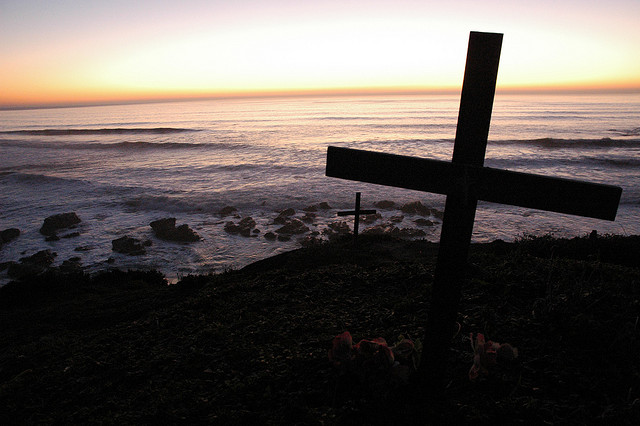Dear Working Preachers,
I have to be honest. I have never cared much for this passage, particularly 16:24, “take up your cross and follow me.” I always get hung up on the “take up your cross” part, because most of the time I really do not know what that means. Or maybe it’s because theologically, if I am honest, I have a rather negative reaction to cross language. It’s not simply that I have issues with gruesome deaths. Or that I am one to eschew the meaningfulness of the crucifixion. But the ubiquity of the cross and our rather bland and rote statements about it have tamed the rather complex nature of its significance.
I have a feeling that there are people in our pews who might have some similar thoughts. How does Jesus’ cross have anything to do with life today? Sure, there are necklaces, rings, pendants, bracelets, but when asked “what does the cross, Jesus’ cross, mean to you?” how will we respond? What we confess about Jesus and his cross better really matter and make a difference for our lives, for how we think about God, and for how we live. If it does none of this, then I wonder if we take Jesus seriously at this point. I’m quite sure that Jesus’ statement here is not theoretical or rhetorical but that Jesus actually wanted the disciples to live it and be it.
Too much of our biblical interpretation and preaching hides behind theologically accepted tenets. Acceptable to whom? And in what circumstances? Atonement theories are a case in point. There are certain things that we think we should say when it comes to the cross that if we don’t, we are not a true “fill in the blank.” This is an opportunity to ask in the sermon, what does the cross really mean to you? I mean really? Not what you think it should mean because you’ve been told what it should mean, because you are a Christian, because you go to church, because you are worried about what the pastor will think, or because you fear that you might get kicked out of church altogether as some sort of imposter believer.
So, I am going to answer my own question. The cross doesn’t do much for me. Call me a heretic. That’s fine. I’ve been called one before and survived, quite well, in fact. Say that I have a problematic atonement theory. That’s also fine. My pneumatology has already been questioned and I survived that, too.
Here’s what I mean.
When it comes to what matters to me theologically the life of Jesus means more than his death, in part because of scholarly interests in the past few years that have caused some serious personal theological reflection. At the same time, I resist “take up your cross” as a justification for suffering. I reject “take up your cross” as some sort of victimization or martyrdom for its own sake. I renounce any claim where I could imagine coming anywhere close to Jesus’ sacrifice.
Yet, if the cross is a symbol for defiance of empire? If the cross is representative of the absolute certainty of the incarnation? If the cross is a model for resistance to the status quo? If the cross is a reflection of our human propensity to eliminate the voices that call for justice, for mercy, for compassion, for love? Well then, I am all for the cross. And I will readily take up that cross, any day.
Just what cross are you willing to take up? And which one are you not?
I find it interesting that Jesus says, “take up your cross and follow me.”
Taking up your cross is not an individual act that validates your faith or demonstrates your willingness to go the distance or a statement of self-sacrifice or self-denial. The cross has everything to do with community. Take up your cross and follow. To follow, by definition, demands something or someone to be followed. Follow me — how do you answer that? Literally following Jesus to the cross, following the person? Isn’t it also following those things that Jesus preached and taught? When Jesus says follow me, what Jesus do you follow? What parts of Jesus’ ministry and teachings do you follow?
One of the things a text like this does for us preachers is to provide opportunity for some serious theological reflection, which probably doesn’t happen very much in the daily demands of ministry. Give yourself some time this week, block it out in your calendar. Take yourself to a coffee shop, to a wine bar, a brewery, out for lunch. Or just be in a place that is comfortable for you. If someone asks to meet with you during that time, say, sorry I have an appointment — you have an appointment with yourself, and with God, trusting that God, Immanuel, is going to be present in your honest exploration of your theological thoughts. Our preaching needs theology time. We are better preachers when we have occasions for assessment and reassessment of where we are theologically. Then we not only know what we bring to the text, but also what we are willing to take up and follow ourselves.
A “cross and follow” kind of life is not a one-time decision but demands and deserves ongoing discernment and deliberation. Note Matthew’s slight change from Mark’s version, “for my sake will find it” (16:26) rather than “for my sake will save it” (Mk 8:35). Thinking about your “cross and follow” life, you never know what you might discover.
Karoline

